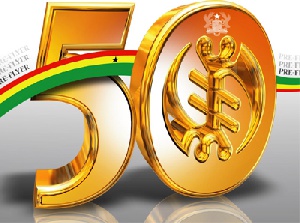It was with great relief, and indeed much glee, when I received news of the redenomination of the cedi that is set to begin some three months after the fiftieth anniversary celebrations of the country. Finally the cloak of zeroes that surrounds central state ineptitude and lack of capacity was coming down in exponential fashion. And what a more fitting occasion for exposure than the golden jubilee of the failure of the state of Ghana?
Such was the bombastic nature of finance in the country that inflation and macro-economic instability had provided a shield to cover the central state’s Lilliputian grandeur and its inability to lead the development process. Words like ‘billions’ and ‘trillions’ associated with the limp cedi had inflated the ego of the central state, overblowing her new claims of an impending giant economic take-off. It turns out that total government revenue, as quoted by the present occupier of the central state stool, will no more be the hi-falutin 27 trillion cedis, but a scarcely visible 2.7 billion Ghanaian cedis, thanks to the redenomination exercise that obliterates 4 zeroes from the dreamy trillions.
The new figure, much closer to the US dollar equivalent, is interesting in its tell-tale revelations about the Ghanaian state. Firstly, as the President told a gathering of underpaid striking teachers, 51 percent of this total revenue goes into the payment of the salaries of government workers and functionaries. What is left, roughly $1.3 billion, plus what the government scrounges from international donors, will finance the purported giant economic take-off. Purchasing power parity aside, this rather low level of revenue, not much more than the operating budget of a district school board of a medium–sized western city, is all that the over-zealous central state in Ghana is able to generate.
Another interesting fact about this de-trillionised figure is that income tax, which for most industrialized countries constitutes the largest percentage of government revenue, is only a small percentage of Ghana government revenue. This is yet another indication of the spuriousness of the central state’s claims to job creation. While they sometimes ‘hire lawyer’ and plead the sophistry of the difficulty of taxing an informal sector that is larger than the formal one in Ghana, one fact stands out clearly. This low capacity of the central state to generate sufficient indigenous revenue, which sends its chief executive and kings on borrowing missions, attest to the truth of the failure of the state in Ghana. Sure, we have not catastrophically disintegrated like our witless cousins in Liberia, Sierra Leone and Ivory Coast, but such disintegration is only the final act of failure.
Though tempting, it would be futile to yield to partisan pressure and ascribe the failure of the state to any particular government. What becomes obvious is that we must stop trying to patch up the crumbling edifice, and rather, examine the foundations that were laid at independence for the success of the state. To paraphrase the Soledad Brothers, the trials and tribulations that have plagued our existence as a nation, began right there in the womb, in the events that led to the birth of the nation.
Fifty years ago when neo-colonialism accorded the founding fathers of the nation the agency of causation to build a modern nation for our peoples, Nkrumah and the CPP made a critical decision in the linkage between agricultural productivity and industrialization. They chose to finance the modernization plans for the whole country with the proceeds from the cocoa economy. Let us not forget that the cocoa economy, which dominated the economy of the country, had been achieved under the twin tutelage of the customary system of production and the British colonial government that was all too eager to bring this royal Mayan delight to the palates of the common folk of Europe and North America. In electing to depend and even enlarge this cocoa economy, the Osagyefo continued the entrenchment of a mode of production suited to an era of subsistence and slavery and not to industrialiation and modernization.
More insidiously, the question of the location of power in the post colonial multi-ethnic state never came up for serious consideration among the founding fathers except for a little skirmish between the NLM and Nkrumah over Federalism. Unfortunately, the Federalists, never able to put up any significant fight, were soundly defeated in a referendum. Colonial unitarism was adopted by the CPP regime, and even though it has paraded in the guise of military or elected governments, it still remains the form of the central state today.
As a result, the birth of Ghana and its continued existence have been founded on the twin props of a parasitic central state and a customary mode of production, both of which are the very antithesis of modern socio-economic development. Much like its antecedent the colonial state, the neo-colonialist state is not designed to meet the development aspirations of the nation. At least the colonial state had the interests of the mother country, Britain, to protect, whereas the post-independent central state, unfettered by this responsibility, and with only mere pretensions to the development process, is really capable of little more than protecting its own self interests. That is why 51 percent of the meager government revenue goes into paying itself. And that is why, the central state, unable to raise indigenous capital, has atrophied into an unsavory display of development wish lists, a fantastic inflation of its efforts, helped along, infact concealed, by the excessive zeroes of an unstable currency.
Today, as we labor under the central state’s platitudes of an imminent giant economic take-off, of presidential special initiatives that plod grudgingly against sustenance and longevity, she smugly drops all pretence of responsibility to the people. Now the state has declared our hapless private sector the engine of growth, making herself merely a facilitator, but fortunately redenomination and the removal of zeroes have become an effective sobering factor in her excesses. For example, it is quite comforting to note that when the Manpower Development and Employment Minister, Abubakar Saddique Boniface says his government hopes to create 170,000 jobs, and has no idea why youth in Ghana are unemployed, I can only refer him to the principle of redenomination and strike four zeroes off his figure. The light bulbs go on and I realize he meant that government hopes to create 17 jobs. Fine thing, this re-denomination. It is a veritable truth meter.
Hopefully our anniversary next March will not be a lamentation of the failure of the state but rather a time to ponder the removal of the parasitic centralism of the state and its customary cousin that underpin our underdevelopment. And when I finally call my favorite cousin, the ‘banker to banker’ operator in Kumasi, and ask him how the 50 year anniversary celebrations are going, he won’t retort with snideness like he did a couple of months ago when he said, ‘Fifty years of what?’
















